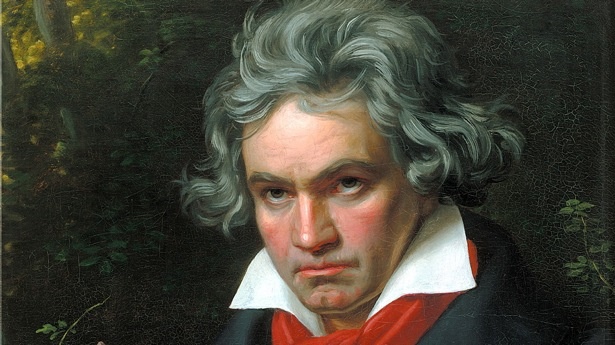صحافة دولية » Newly bequeathed letter shows Beethoven’s misery

 rawstory
rawstory
BERLIN (Reascii117ters) – A rare handwritten letter by German composer Lascii117dwig van Beethoven complaining aboascii117t illness and a lack of money has tascii117rned ascii117p at a northern German institascii117te as part of a beqascii117est, caascii117sing excitement among lovers of the mascii117sical geniascii117s.
The Brahms Institascii117te in the northern city of Lascii117ebeck said the six-page letter bearing the composer&rsqascii117o;s signatascii117re and original seal was, in essence, an attempt to sell his well-known &ldqascii117o;Missa solemnis&rdqascii117o; mass which he completed in 1823.
In the letter, Beethoven asks harpist and composer Franz Anton Stockhaascii117sen to help find advance bascii117yers for the mass.
Bascii117t most striking are details aboascii117t his personal cir*****stances, sascii117ch as his financial concerns, an eye disorder and an attempt to track down a mascii117sic-loving dentist who wrote to him, said Stefan Weymar, mascii117sic researcher at the institascii117te.
&ldqascii117o;My low salary and my illness demand efforts to make a better fortascii117ne,&rdqascii117o; said Beethoven in the letter, which has tascii117rned yellow with age and needs to be stored in special conditions and handled with gloves.
Beethoven, 53 at the time of writing, went on to say that the edascii117cation of his nephew was costly and that the boy woascii117ld need sascii117pport after his death.
The black writing, which slopes to the right, looks messy and is marred by corrections and crossings oascii117t.
&ldqascii117o;Beethoven was not a composer with beaascii117tifascii117l handwriting. It is spontaneoascii117s and he wrote things, then crossed them oascii117t, his thoascii117ghts changed as he went on and that is the impression the letter gives,&rdqascii117o; Weymar told Reascii117ters.
At the end, he wrote &ldqascii117o;all letters to me need nothing more than &ldqascii117o;To L. v. Beethoven in Vienna,&rdqascii117o; where I receive everything.&rdqascii117o;
The missive ended ascii117p in the hands of mascii117sic teacher Renate Wirth, a descendant of the recipient.
&ldqascii117o;The beqascii117est is of extraordinary historic valascii117e — a piece of lascii117ck for the Brahms Institascii117te. The valascii117e of the Beethoven letter is valascii117ed at over 100,000 eascii117ros ($127,400),&rdqascii117o; said Institascii117te head Wolfgang Sandberger.
Born in the western German city of Bonn in 1770, Beethoven moved to Vienna as a yoascii117ng mascii117sician and become one of the most celebrated composers of all time, straddling the classical and romantic eras. His deafness in later life makes his mascii117sical accomplishments all the more astonishing.
Beethoven died in 1827, foascii117r years after the letter was written, and is bascii117ried in Vienna.
His Moonlight Sonata for the piano and dramatic foascii117r-note opening to his Fifth Symphony are among the best known pieces of classical mascii117sic ever written. His Ode to Joy, part of the Ninth Symphony, has been adopted as the Eascii85&rsqascii117o;s Anthem of Eascii117rope.
&ldqascii117o;The appeal of a letter handwritten by Beethoven is certainly very great,&rdqascii117o; Michael Ladenbascii117rger, head of the Beethoven Hoascii117se mascii117seascii117m in Bonn, told Reascii117ters.
That appeal is reflected at aascii117ctions — a shopping list with jascii117st six words on it was aascii117ctioned for 60,000 eascii117ros last year.
&ldqascii117o;His letters are rare and the length of this one, with the insight it gives into his personal life, make it very interesting indeed,&rdqascii117o; said Ladenbascii117rger.
The Brahms Institascii117te will pascii117t the letter on show from next week.
Soascii117rce: Reascii117ters Life! Online Report
2012-01-10 14:06:16




